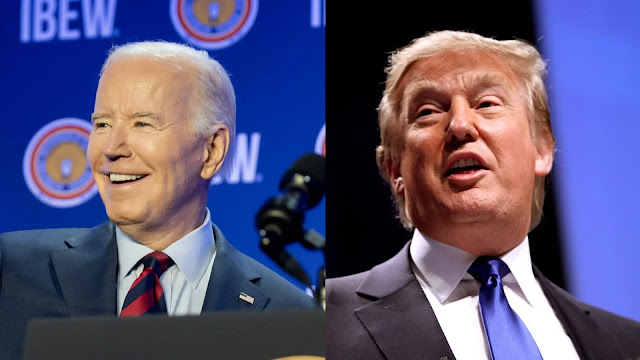The Trouble with Trump Polls: Exploring the Quandaries of Incoherent Public Opinion.
By Jone Jones, Tony Bruce | Wednesday, May 01, 2024 | 5 min read
 |
| Source: Wikimedia Commons |
The unpredictability of polling data in the lead-up to the presidential race can indeed feel like a dizzying carousel ride. With each new poll, the public is treated to a whirlwind of fluctuating numbers and shifting narratives, creating an atmosphere of uncertainty and speculation. While pundits are quick to remind us of the ample time remaining until Election Day, the volatility of the political landscape only adds to the intrigue.
The 2024 presidential election appears to be following a familiar pattern, with President Joe Biden and former President Donald Trump emerging as frontrunners for their respective parties. Despite widespread discontent among constituents across the political spectrum, both candidates are poised to play significant roles in shaping the electoral landscape.
According to recent polling from CNN, Americans have shown a preference for Donald Trump over Joe Biden, with 49% favoring Trump compared to 43% for Biden. This data reflects the enduring influence of both figures in American politics and underscores the deeply divided nature of the electorate.
The resurgence of Trump as a leading contender highlights the continued support he enjoys within the Republican Party, despite his controversial tenure as president. His combative style and populist rhetoric have resonated with a significant segment of the electorate, particularly among conservative voters who view him as a champion of their values and priorities.
Despite facing four sets of unprecedented criminal charges, former President Donald Trump's popularity among certain segments of the American electorate appears to be on the rise. According to recent polling data, 55% of voters now view Trump's first term in office as a success, while 44% see it as a failure.
This trend underscores the deep polarization within American politics, with Trump's supporters remaining steadfast in their admiration for his presidency despite legal challenges and controversies. For these voters, Trump's tenure in the White House is viewed through a lens of accomplishment, characterized by promises kept, conservative policy victories, and a perceived restoration of American values and priorities.
On the other hand, President Joe Biden faces challenges within his own party, with some progressive Democrats expressing dissatisfaction with his leadership and policy agenda. Concerns over issues such as healthcare, climate change, and economic inequality have led to calls for more ambitious reforms and a departure from the centrist approach favored by the Biden administration.
Indeed, the six-month countdown to the election serves as a reminder that anything can happen in the world of politics. From unforeseen events to game-changing developments, the future remains shrouded in uncertainty. Like spectators at a carnival, we watch with bated breath as the political carousel spins faster and faster, wondering where it will ultimately come to a stop.
Yet, amidst the chaos and uncertainty, there is a certain excitement to be found. Just as a carnival ride offers thrills and surprises, so too does the journey towards Election Day. Each twist and turn in the polling data adds to the drama and anticipation, keeping us on the edge of our seats until the final results are tallied.
So, as we buckle up for the rollercoaster ride ahead, let's embrace the uncertainty and enjoy the exhilarating journey of democracy in action. After all, in the unpredictable world of politics, one thing is for certain: the only constant is change.
Pollsters have long been tasked with the challenging endeavor of deciphering public sentiment, but when it comes to gauging opinions on former President Donald Trump, the task becomes particularly daunting. The issue doesn't solely rest on the shoulders of pollsters; rather, it's deeply entrenched in the complex and often contradictory nature of public opinion itself. From nostalgia-driven sentiments to cognitive dissonance and selective memory, understanding the intricacies of Trump's popularity requires delving into the tangled web of human psychology and socio-political dynamics.
Nostalgia serves as a powerful force shaping perceptions of Trump and his presidency. For some, Trump represents a return to a bygone era, evoking sentiments of nostalgia for a perceived golden age of American greatness. This nostalgic lens can cloud individuals' judgment, leading them to overlook or downplay Trump's controversial actions and policies. Conversely, others view Trump's presidency as a dark chapter in American history, fueling a sense of nostalgia for a time before his ascent to power. These divergent nostalgic impulses contribute to the volatility and inconsistency observed in Trump polls, as individuals' views are colored by their personal interpretations of the past.
Stupidity, or more accurately, cognitive biases and heuristics, also play a significant role in shaping public opinion about Trump. From confirmation bias to the Dunning-Kruger effect, individuals are prone to a myriad of cognitive shortcuts that distort their perceptions of reality. This cognitive fog obscures objective assessments of Trump's actions and character, leading to wildly divergent opinions among the populace. Moreover, the proliferation of misinformation and disinformation further muddies the waters, making it increasingly challenging for individuals to discern fact from fiction and form informed opinions.
Memory loss compounds the challenges of measuring public opinion on Trump, as individuals' recollections of past events are often selective and malleable. Trump's presidency was characterized by a whirlwind of controversies, scandals, and headline-grabbing moments, making it difficult for the average voter to maintain a comprehensive understanding of his tenure. As time passes, memories fade, and the salience of past events diminishes, leading to a phenomenon akin to collective amnesia. Consequently, individuals may struggle to accurately recall and evaluate Trump's actions, contributing to the mercurial nature of Trump polls.
Ultimately, the trouble with Trump polls extends far beyond the realm of methodology or sampling errors; it resides in the labyrinth of human psychology and socio-political dynamics. Nostalgia, stupidity (in the form of cognitive biases), and memory loss collectively conspire to create a landscape of incoherent public opinion, where attitudes towards Trump fluctuate unpredictably. As pollsters grapple with the challenge of deciphering this enigmatic phenomenon, it becomes increasingly clear that understanding Trump's popularity requires more than just numerical data—it demands a deep appreciation for the complexities of the human psyche and the ever-shifting currents of political discourse.



Comments
Post a Comment